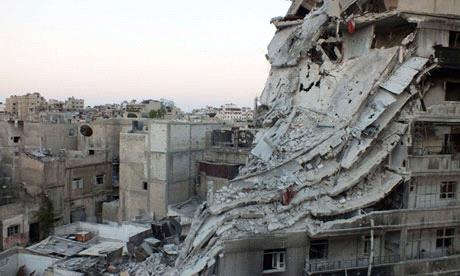Ammon News - (Al Jazeera) - Government forces in Syria's central city of Homs have attacked rebel positions with artillery and air strikes for the third straight day, activists said.
Opposition activists said a woman and two children were killed on Sunday in the strike by government aircraft on the old city, home to hundreds of civilians.
They said rebels defending the old centre of Homs and five adjacent districts had also largely repelled a ground attack on Saturday by Syrian forces, backed by Hezbollah fighters from neighbouring Lebanon.
Mohammad Mroueh, a member of the opposition "Homs Crisis Cell", said at least 25 government troops, including four Hezbollah fighters, had been killed in Homs in the previous 24 hours.
The reports are difficult to verify as independent media is not allowed to report freely in Syria.
As the violence raged, the six-member Gulf Cooperation Council (GCC) and the European Union meeting in Bahrain called for a political solution to Syria's conflict, while regional powerhouse Saudi Arabia urged the EU to arm the opposition.
The GCC is made up of Saudi Arabia, Bahrain, Qatar, Oman, the United Arab Emirates and Kuwait.
Opposition sources and diplomats said the advance by Syrian forces secured a main road link to Hezbollah strongholds in Lebanon and to army bases in Alawite-held territory near the Syrian coast, the main entry point for Russian arms that have given the Syrian government an advantage in firepower.
Khalidiya link
Homs, the third largest city in Syria, was one of the first to join the uprising against President Bashar al-Assad's government more than two years ago.
At least 100,000 people have been killed since the Syrian revolt erupted in March 2011, making the uprising the bloodiest of the Arab Spring revolutions against entrenched rulers.
Video footage taken by the activists in Homs showed bodies of civilians being carried in blankets and a man holding a wounded child with a gash in his head.
Rebel fighters fought government forces backed by tanks in the old covered market, which links the old city with Khalidiya, a district inhabited by members of tribes who have been at the forefront of the armed insurgency.
"After failing to make any significant advances yesterday, the regime is trying to sever the link between Khalidiya and the old city," Abu Bilal, one of the activists, told the Reuters news agency from Homs.
Pro-government newspaper Al-Watan said the army "made qualitative new advances in the city of Homs amid fierce clashes with armed militias in Khalidiya and Bab Hud".
The Syrian National Coalition said in a statement that it feared that Syrian forces would use chemical weapons on the city "after the government's campaign on Homs failed to achieve any important results".
Syrian authorities have denied using chemical weapons in the conflict and instead accused the opposition of using them.
The United States has concluded that Syrian government forces have used chemical weapons on a small scale against the opposition many times in the last year.
Bahrain meeting
Meanwhile, British Foreign Secretary William Hague said Assad must halt his assault on Homs.
"It is clear that Assad is not interested in peace for Syria but rather is prepared to kill tens of thousands of innocent people and deprive millions more of humanitarian aid rather than work for a resolution of this conflict, which has already killed too many [people]," said Hague.
"I call upon the Assad regime to cease its brutal assault on Homs and to allow full humanitarian access to the country. The violence must end and those responsible must be held to account."
In Bahrain, EU foreign policy chief Catherine Ashton and the foreign ministers of the GCC pledged to pool their efforts to help bring peace to Syria.
They underscored "the utmost urgency of finding a political settlement of the Syrian conflict" and vowed to "spare no efforts" to help convene a conference on Syria, which the US and Russia have been striving to hold in Geneva.
There was no mention of an oft-repeated demand by Gulf Arab powerbrokers Saudi Arabia and Qatar to arm the opposition.
But Saudi Foreign Minister Prince Saud al-Faisal insisted the EU should do so "immediately" while urging the international community to take steps "to ban the supply of weapons" to Damascus from its allies Iran and Russia.
